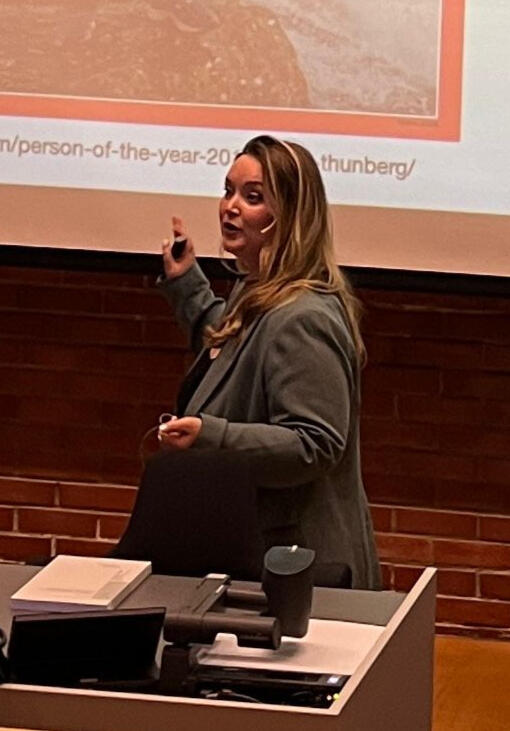Andrea Vik
Postdoctoral Researcher in Political Psychology.

Welcome to my website! I am currently a postdoctoral research fellow at the Centre for the Politics of Feelings, a partnership between the Department of Psychology, Royal Holloway University of London, and the School of Advanced Study, University of London. I have a PhD in Political Science from the Norwegian University of Science and Technology (NTNU) and an MSc in Communication Science from the University of Amsterdam. My research sits at the nexus of political psychology, political communication, and political representation.If you’d like to follow my work, you can add me to your networks or email me via the icons above.
About me
I investigate how psychological constructs, emotions, and affect shape political attitudes and behavior, as well as how political communication both influences and leverages these affective dimensions. Methodologically, I specialize in quantitative and experimental approaches. I am also an open science enthusiast and care greatly about transparency, reproducibility, and integrity in research practices. I work to ensure academia is an inclusive and equitable space that fosters collaborations, and I dedicate time and effort to teaching and service.My work broadly follows three interrelated lines of inquiry:
Affective Representation: The affective and psychological foundations of political representation
Embodied Politics: The role of interoception and somatosensory experience in political emotions, ideologies, and identities, and their influence on political attitudes and behavior
Political Marginalization, Radicalization, and Violence: The psychological mechanisms that drive radicalization, extremism, and support for political violence.
Research
Publications / ForthcomingDe Wilde, P., Vik A., Treib O., & Aarøe L. "The Impact of Unelected Representatives on Citizens' Satisfaction with Democracy: A Cross-National Survey Experiment" Forthcoming European Journal of Political Research.Vik A., De Wilde P., Treib O., & Aarøe L (2025). "Venturing Beyond the Vote; Routes to Feeling Represented Through Unelected Representation". British Journal of Political Science, 55, e102. doi:10.1017/S0007123425000080Vik, A (2025). Unelected Representation. In Nai, A., Grömping, M., & Wirz, D. (Eds). Elgar Encyclopedia of Political Communication. Edward Elgar Publishing. Accepted version. Preprint DOI: https://doi.org/10.31219/osf.io/2d5twVik A. & De Wilde P (2024) ."Reconceptualizing Feeling Represented: A New Approach to Measure How Feelings of Political Representation are Constructed". Acta Politica. https://doi.org/10.1057/s41269-024-00358-2
Manuscripts in Progress
Vik A., Galvez-Pol A., Park S., Tsakiris M. “Politics Embodied: How Politics Shapes and Is Shaped by the Bodily Experience of Emotion”. Preprint: https://osf.io/preprints/psyarxiv/e3buw_v1/Vargui C., Vik A., Nai A., Hino R., & Faye R. “Past Petty Pouting: Perceived Marginalization, Need for Chaos, and Support for Political Violence in the USA and Japan”. Under review.Vik A. “Affective Representation: A Constructivist Framework.” In Preperation.
PhD Dissertation
Vik A., "Unelected Representation: A Psychological Perspective". Norwegian University of Science and Technology. Defended June 2024. https://ntnuopen.ntnu.no/ntnu-xmlui/handle/11250/3144342
Teaching
I offer a diverse teaching portfolio encompassing theoretical and methodological courses at both undergraduate and graduate levels. At the University of Amsterdam, I gained exemplary teaching experience as a part-time junior lecturer, teaching Introduction to Communication Theory, Philosophy of Science, and Quantitative Content Analysis alongside my studies. During my PhD at NTNU, I sought out additional teaching responsibilities as a teaching assistant and lecturer, in addition to delivering guest lectures, workshops, and seminars. Students describe my teaching style as engaging, informal, inclusive, and supportive. My teaching portfolio has fortified my commitment to pedagogy and education, and I am passionate about combining scientific rigor with societal returns and contributing to creating decisive value for students and society.You can find some examples of my lectures below.
I founded Hype Club at NTNU, an initiative designed to cultivate a more inclusive and supportive environment for early-career scholars. I see potential in implementing this at more universitities and not only for early career scholars. Hype Club is essentially informal and small research groups to create a support system for academic staff. The goal of the hype club: a safe and positive academic environment. This goal may seem straightforward but it requires an open and honest approach in which no ideas are dumb and we can brainstorm, vent, cheer, address concerns, but most importantly hype each other up to create a more positive working environment. If you are interested you can read more about Hype Club here:
